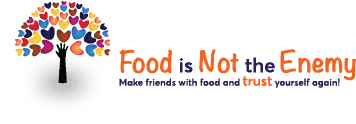Dietitian Services
How can a Dietitian
Help You Have a Great Relationship with
Food and Your Body?
A registered dietitian will support and guide you to find helpful and realistic solutions to your food and body image struggles. Whether you are in eating disorder recovery or have struggled with chronic dieting, a dietitian that understands your unique challenges will help you develop a more positive relationship with food and body image. A dietitian can help you follow an Intuitive Eating and Health at Every SizeⓇ framework to help you to:
* Make peace with food and ditch dieting
* Stop the restrict-binge cycle
* Re-learn your internal hunger and fullness cues
* Regain the freedom to include a variety of foods into your life
* Learn how to adequately nourish your body for your unique lifestyle
* Feel satisfied with your meals
* Build trust in your body’s natural ability to self-regulate and maintain a healthy-for-you weight
* Stress less about food and enjoy life more
Working with a dietitian will give you a chance to address food issues directly, to problem solve specific challenges in your relationship with food and guide you in steps toward healthy eating for your body. Paired with counseling, dietetic support with someone who understands your eating disorder, will help you gain ground in your recovery and healing.
Frequently Asked Questions
At Food Is Not the Enemy, we believe that focusing on weight is a poor approach to improving health. Rather, we focus on improving behaviors that will enhance your mental, emotional and physical health. Using the Intuitive Eating and HAES frameworks, a dietitian will help you to become more in tune with your body’s nutritional needs, which can help your body to settle into it’s natural set point weight.
A dietitian will work with you to help make positive nutrition and lifestyle changes that are sustainable and unique to your needs. The dietitian will meet you where you are at as you work together to come up with strategies to build a healthy relationship to food and body. Consulting with a dietitian can also be helpful with the following: gastrointestinal disorders, diabetes, kidney disease, food intolerance’s or allergies, children and picky eating, and sports performance.
You can schedule a free consultation with our dietitian, here, http://foodisnottheenemy.com/contact/, Or call 360-26-4141.
Although understandable that you would seek weight loss living in a culture that focuses on thin as ideal, weight loss is not only not in your control it is also a poor approach to improving health. Think of all the diets you have been on… you may have lost weight but you likely regained it all back again, and sometimes more. Weight loss and dieting to lose weight is not sustainable, for anyone. Therefore, we focus on improving behaviors that will enhance your mental, emotional and physical health. Using the Intuitive Eating and Health at Every Size frameworks, a dietitian will help you to become more in tune with your body’s nutritional needs, which can help your body to settle into it’s natural set point weight.
Your health insurance company may require a physcian referral for nutrition counseling to be covered. It is best to check with your insurance provider before scheduling an appointment. If your insurance provider does not require a referral or you are paying out of pocket, you do not need a referral to see a dietitian at Food Is Not the Enemy.
Not all insurance companies cover nutrition counseling with a dietitian. It is best to talk to your insurance provider before making an appointment if you are unsure.
It is best to see a licensed and registered dietitian, as they have completed 4+ years of college education and 1200+ hours of supervised experience and have been properly educated and trained in nutritional science. The term “nutritionist” is not regulated, which means anyone can call themselves a nutritionist, regardless of their education. To be sure you are seeing a registered dietitian, look for the credentials RD or RDN. .
